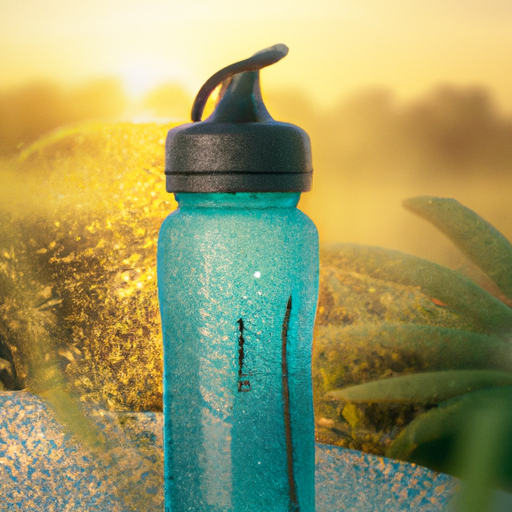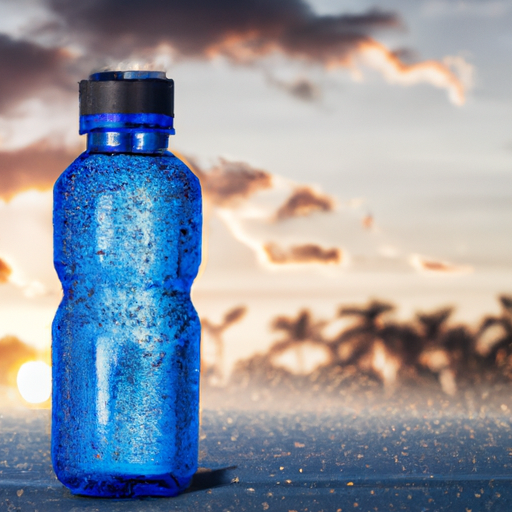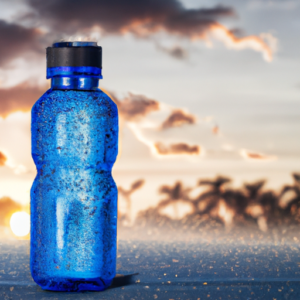Are you curious about how important hydration is during exercise? Well, let me tell you, it’s a crucial factor in maximizing your performance and keeping your body healthy. Whether you’re hitting the gym, going for a run, or participating in any other physical activity, staying hydrated is key to achieving your fitness goals. In this article, you’ll find out just how vital hydration is during exercise and why you should never underestimate its importance. So, sit back, relax, and prepare to learn more about the wonders of staying hydrated while breaking a sweat.
If you’ve ever wondered why staying hydrated during exercise is stressed so much, this article is your perfect guide. We’ll dive into the reasons why hydration plays a crucial role in optimizing your workout routine and how it affects your body’s overall performance. From understanding the impact of dehydration on your muscles and organs to debunking common hydration myths, you’ll gain invaluable knowledge that will take your exercise game to the next level. So, get ready to quench your thirst for knowledge and discover why hydration truly is the key to unlocking your fitness potential.

Understanding the Importance of Hydration
When it comes to exercise, staying hydrated is crucial for optimal performance and overall well-being. Dehydration can have a significant impact on both physical and cognitive function, making it essential to prioritize proper hydration before, during, and after exercise. In this article, we will explore the importance of hydration, the effects of dehydration, and the benefits of staying properly hydrated. We will also discuss hydration guidelines for exercise, common misconceptions, and pitfalls to avoid.
Dehydration and its Impact on Performance
Dehydration occurs when the body loses more fluid than it takes in. It can have detrimental effects on performance, making it difficult to achieve your exercise goals. During exercise, your body relies on water to regulate its temperature, transport nutrients, and eliminate waste. When you are dehydrated, your body struggles to perform these essential functions, leading to decreased performance, fatigue, and an increased risk of injury.
The Role of Water in Regulating Body Temperature
One of the primary roles of water in the body is to regulate body temperature. During exercise, your body generates heat, and in response, it sweats to cool itself down. Sweat is made primarily of water, and when you are dehydrated, your body is unable to produce an adequate amount of sweat. As a result, your body temperature can rise quickly, leading to overheating, heat exhaustion, and even heatstroke. It is therefore crucial to stay hydrated to maintain your body’s ability to regulate its temperature effectively.
The Effect of Dehydration on Cognitive Function
Dehydration doesn’t just affect your physical performance; it can also have a significant impact on cognitive function. Research has shown that even mild dehydration can impair concentration, alertness, and memory, making it harder to stay focused during exercise. Moreover, dehydration can lead to a decrease in reaction time and decision-making abilities, increasing the risk of accidents or injury while working out. To ensure optimal cognitive function and overall performance, maintaining proper hydration levels is essential.
Hydration Guidelines for Exercise
Determining Your Fluid Needs
The amount of water you need to consume during exercise depends on various factors, including the intensity and duration of your workout, as well as individual factors such as body size, sweat rate, and environmental conditions. As a general guideline, aim to drink at least 16-20 ounces (500-600 ml) of water 2-3 hours before exercise, and another 8-10 ounces (250-300 ml) 10-20 minutes before starting your workout. During exercise, try to drink 7-10 ounces (200-300 ml) of water every 10-20 minutes, and after exercise, replenish fluids by consuming 16-24 ounces (500-700 ml) for every pound (0.5 kg) lost during exercise.
Pre-Exercise Hydration Strategies
To ensure adequate hydration before exercise, it is important to start the hydration process early. Aim to consume fluids throughout the day leading up to your workout, rather than trying to chug large amounts of water right before you start. This will give your body enough time to absorb and distribute the fluids, helping you start your workout in a hydrated state.
During-Exercise Hydration Strategies
During exercise, it is essential to drink fluids regularly to replace the water lost through sweat. Opt for water or sports drinks that contain electrolytes to help replenish the minerals lost through sweat. Sip on fluids throughout your workout, rather than waiting until you feel thirsty. Thirst is not a reliable indicator of hydration, and by the time you feel thirsty, you may already be somewhat dehydrated. Therefore, it is important to stay proactive and regularly consume fluids to maintain proper hydration levels.
The Benefits of Proper Hydration
Improved Physical Performance
Proper hydration is directly linked to improved physical performance. When you are adequately hydrated, your muscles are able to function optimally, allowing you to perform at your best. Water helps transport nutrients to your muscles, aiding in energy production and preventing muscle cramps and fatigue. Additionally, staying hydrated can enhance your endurance, making it easier to sustain high-intensity workouts for longer periods of time.
Reduced Risk of Heat Illness
As mentioned earlier, dehydration can lead to heat-related illnesses such as heat exhaustion and heatstroke. By staying properly hydrated, you can reduce the risk of these conditions and ensure that your body can effectively regulate its temperature during exercise. This is especially important when exercising in hot and humid environments, where the risk of overheating is higher.
Enhanced Recovery and Muscle Function
Proper hydration is essential for post-exercise recovery. After a workout, your body needs water to replace the fluids lost through sweat and to aid in the repair and rebuilding of muscles. Hydration also helps facilitate the removal of waste products, such as lactic acid, which can contribute to muscle soreness and fatigue. By staying hydrated, you can speed up the recovery process and promote optimal muscle function.

Signs and Symptoms of Dehydration
Thirst: A Late Indicator of Dehydration
Feeling thirsty is a sign that your body is already dehydrated. Thirst is a feedback mechanism that kicks in when your body is in need of water, but it is not always an accurate indicator of hydration status. Waiting until you’re thirsty to drink can lead to dehydration, so it is important to drink fluids regularly, even if you don’t feel thirsty.
Dark Colored Urine and Reduced Urination
Another sign of dehydration is dark-colored urine and a decrease in urination frequency. When you are properly hydrated, your urine should be a pale yellow color. Darker urine may indicate that you need to drink more water. Additionally, if you notice a significant reduction in urination or are not producing urine at all, it may be a sign of severe dehydration and requires immediate attention.
Muscle Cramps and Fatigue
Muscle cramps and fatigue during exercise can be indicators of dehydration. When you sweat, your body loses electrolytes such as sodium, potassium, and magnesium, which are essential for muscle function. When these electrolytes become imbalanced due to dehydration, you may experience muscle cramps and feel fatigued. Proper hydration can help prevent these symptoms and keep your muscles functioning properly.
Dehydration Risk Factors
Hot and Humid Environments
Exercising in hot and humid environments increases the risk of dehydration. The combination of high temperatures and humidity can cause excessive sweating, leading to a greater fluid loss. It is crucial to consume fluids regularly in these conditions to maintain proper hydration levels.
Intense Exercise and Prolonged Duration
The intensity and duration of your exercise can also increase the risk of dehydration. High-intensity workouts or prolonged exercise sessions can lead to increased sweat production and higher fluid losses. As a result, it is important to increase your fluid intake accordingly to compensate for these losses.
Individual Variations in Sweat Rate
Every individual has a different sweat rate, which is influenced by factors such as genetics, fitness level, and acclimation to exercise. Some people naturally sweat more than others, meaning they may require more fluids to stay properly hydrated. It is important to listen to your body and adjust your fluid intake based on your specific needs.
Hydration Strategies for Different Types of Exercise
Endurance Exercise
For endurance exercises such as long-distance running or cycling, it is important to focus on both hydration and fueling. In addition to drinking fluids regularly, consider consuming sports drinks or other sources of carbohydrates and electrolytes to replenish energy stores and maintain proper hydration.
Strength Training
While strength training may not cause as much fluid loss as endurance exercises, it is still important to stay hydrated. Drink fluids before, during, and after your strength training workouts to support muscle function and aid in recovery.
High-Intensity Interval Training
High-intensity interval training (HIIT) workouts can be particularly challenging when it comes to hydration. Due to their intense nature, these workouts often lead to significant fluid loss through sweat. Stay hydrated by drinking fluids before, during, and after your HIIT workouts, and consider consuming sports drinks or electrolyte replacements to replenish the minerals lost.
Choosing the Right Hydration Methods
Water vs. Sports Drinks
Water is a suitable choice for most exercise sessions, especially those lasting less than an hour. However, for longer and more intense workouts, sports drinks can be beneficial. Sports drinks contain electrolytes and carbohydrates, which can help replenish the minerals lost through sweat and provide an additional source of energy.
Electrolyte Replacement Products
In addition to sports drinks, there are various electrolyte replacement products available on the market. These products come in the form of powders, tablets, or gels. They are designed to provide a concentrated source of electrolytes that can be mixed with water or consumed directly. Electrolyte replacement products can be useful for individuals who experience excessive sweating or have an increased need for electrolyte replenishment.
The Role of Hydration Packs and Bottles
Hydration packs and bottles are convenient tools for staying hydrated during exercise, especially for outdoor activities or longer workouts. Hydration packs are backpack-like systems that contain a water reservoir and a drinking tube, allowing you to sip on water easily while on the move. Hydration bottles are portable containers that can be carried during exercise to ensure access to fluids. Choose the method that suits your preferences and exercise needs.
Common Misconceptions About Hydration
Drinking More Water is Always Better
While staying hydrated is important, drinking excessive amounts of water is not necessarily better. Overhydration, or hyponatremia, can occur when you consume too much water without replenishing electrolytes. This can lead to imbalances in the body’s electrolyte levels and potentially be dangerous. It is important to drink fluids in moderation and consider the duration and intensity of your exercise before determining your fluid needs.
Thirst is a Reliable Indicator of Hydration
As mentioned earlier, relying solely on thirst as a hydration cue can be problematic. Thirst is a late indicator of dehydration, meaning you may already be dehydrated by the time you feel thirsty. It is important to drink fluids regularly, even if you don’t feel thirsty, to prevent dehydration.
Caffeine Leads to Dehydration
Contrary to popular belief, moderate consumption of caffeine does not necessarily lead to dehydration. While caffeine is a diuretic and can increase urine production, studies have shown that the diuretic effect of caffeine is minimal in people who regularly consume it. In fact, caffeinated beverages like coffee or tea can contribute to your overall fluid intake and help keep you hydrated.
Hydration Pitfalls to Avoid
Overhydration and Hyponatremia
As mentioned earlier, overhydration can lead to hyponatremia, a condition characterized by low sodium levels in the blood. This can be dangerous, as it can lead to symptoms such as nausea, confusion, seizures, and even coma. To avoid overhydration, drink fluids in moderation and consider your individual fluid needs based on factors such as body weight, sweat rate, and exercise duration.
Neglecting Hydration After Exercise
Many people focus on hydrating during exercise but neglect to continue hydrating afterwards. After a workout, it is important to replenish the fluids lost through sweat to support the recovery process. Make sure to drink water or other hydrating fluids within the first hour after exercise to aid in rehydration.
Relying Solely on Thirst as a Hydration Cue
As mentioned earlier, waiting until you feel thirsty to drink fluids can lead to dehydration. Instead of relying solely on thirst, make it a habit to drink fluids regularly before, during, and after exercise. Set reminders or use hydration tracking apps to stay on top of your fluid intake.
Conclusion
In conclusion, hydration plays a vital role in exercise performance and overall well-being. Proper hydration is essential for regulating body temperature, maintaining cognitive function, and supporting muscle function. By following hydration guidelines for exercise, staying aware of dehydration risk factors, and choosing the right hydration methods, you can ensure optimal hydration during your workouts. Remember to stay proactive, listen to your body, and drink fluids regularly to maintain proper hydration levels. With attention to hydration, you can enhance your performance, reduce the risk of heat illness, and support your overall fitness journey.

